Navigation
UNEP’s India Solar Loan Programme Wins Energy Globe
After helping more than 100,000 people in 18,000 Indian households finance clean energy from their PV solar electric home systems, the United Nations Environment Programme’s Indian Solar Loan Programme has been honoured with a prestigious Energy Globe.
After helping more than 100,000 people in 18,000 Indian households finance clean energy from their PV solar electric home systems, the United Nations Environment Programme’s Indian Solar Loan Programme has been honoured with a prestigious Energy Globe.
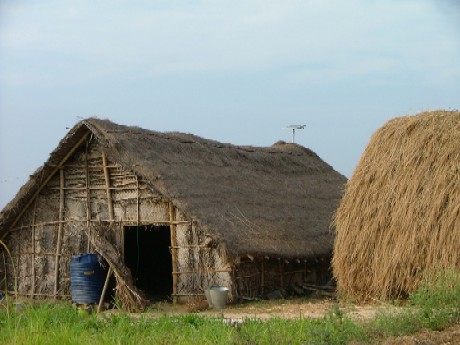 |
| Rural Home With Solar LIghts; note solar collector on roof |
The Energy Globe (www.energyglobe.info) is the “World Award for Sustainability” and considered today’s most prestigious and acknowledged environmental award bestowed on projects from all over the world “which make careful and economical use of resources and employ alternative energy sources”.
“The award shows that improving access to finance can help to influence the shift towards cleaner energy in the developing world”, says UNEP Executive Director Achim Steiner. “In the past there has been a lot of investment in market development schemes, particularly subsidies to lower capital costs, but with little success.”
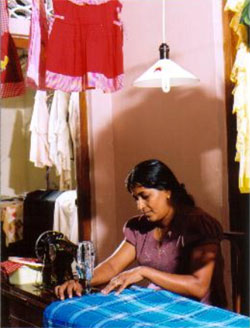 |
| Better lives thanks to solar |
Launched in 2003 with support from the UN Foundation and Shell Foundation, the four-year Indian Solar Loan Programme is a partnership between UNEP, the UNEP Risoe Centre on Energy, Climate and Sustainable Development, and two of India’s largest banking groups to establish a consumer credit market for financing solar home systems (SHS) in southern India where the conventional electricity grid is absent or unreliable.
The innovative financing arrangement involves an interest rate reduction, market development support, and a process to qualify solar suppliers. The interest rate reduction was phased out during the Programme and today the market for financing solar home systems is on purely commercial terms.
Although the solar home sector was a small, cash-only business in 2003, today the market is growing with more than 50% of sales financed by banks. There are now 20 banks with networks of more than 2,000 branches offering solar financing.
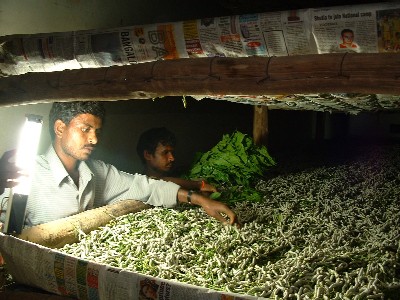 |
| Silk Worms Being Fed Under Solar Lights |
UNEP Programme Manager Eric Usher, who attended the gala award ceremony in Brussels on the evening of 11 April, says the Programme provided a strong market signal, rather than the market distortion that often accompanies larger development projects. Even though the banks did not profit directly from the $1 million interest rate reduction fund since the benefits where passed on to the customer, they still eagerly promoted solar lending because they saw the opportunity to develop a new credit market. Further, the economics of the solar systems changed only very slightly with the interest rate reduction, so the growth of the market had little to do with the lower cost of systems. It’s about access to finance, he says, adding that when banks are motivated to lend to a new sector the barriers to market uptake start to fall.
The UNEP approach was to find banking partners who wanted to develop this sector but needed a small amount of help to get going. “Acting small can sometimes be better than acting big”, says Mr. Usher, “and people partner for better reasons with a better alignment between international and national actors.”
UNEP has used the success of the Indian Solar Loan Programme to expand into other areas, including solar water-heating loan programmes now underway in Morocco and Tunisia and others in development for Algeria, Indonesia, Mexico and Chile.
Note:
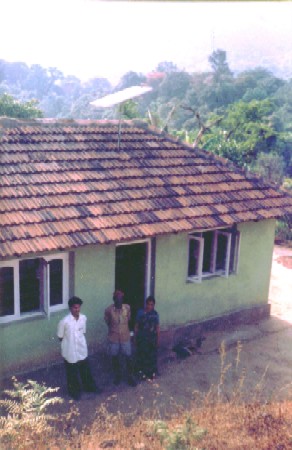 |
| Family with solar panel on roof |
A four-year $7.6 million effort was launched in April 2003 to help accelerate the market for financing solar home systems in southern India. The project is a partnership between UNEP Energy Branch, UNEP Risoe Centre (URC), two of India's major banking groups - Canara Bank and Syndicate Bank, and their sponsored Grameen banks.
India's solar PV manufacturing sector has grown significantly since the 1990s, mostly for export, however the market for solar home systems has been slow to develop, in part due to a lack of consumer financing options. The aim of this effort is to help Canara bank and Syndicate bank develop lending portfolios specifically targeted at financing solar home systems (SHS). With the support of the UN Foundation and Shell Foundation, the project provides an interest rate subsidy to lower the cost to customers of SHS financing.
Indian banks are these days keen to develop new loan products and the partnership with UNEP allows them to do so in a growing clean energy sector.
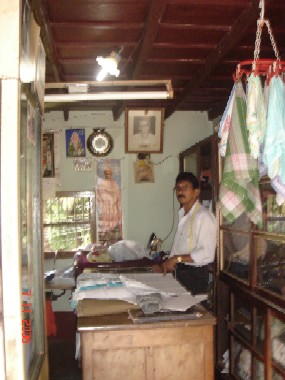 |
| Tailoring Shop |
An interest subsidy helps them to build solar financing portfolios without distorting the credit risk - sometimes a problem with guarantees - or the existing cash market for solar home systems.
Five solar vendors completed the programmes` qualification process, making their customer eligible for financing. An update of programme status can be downloaded here.
Photo credit: All photographs by Selco India.
Additional Reference: SWERA (Solar and Wind Energy Resource Assessment) Programme http://swera.unep.net/
Includes: Maps of Wind and Solar Energy
For more information on the project visit:
www.uneptie.org/energy/act/fin/india/
For more information, please contact:
Robert Bisset, UNEP Spokesperson for Europe
Cell: +33-6-2272-5842
or
Nick Nuttall, UNEP Spokesperson, in Nairobi
Tel: +254-207-623084
Cell: +254-733-632-755
***********************************
Jim Sniffen
Information Officer
UN Environment Programme
New York
tel: +1-212-963-8094/8210
*********************************
UNEP is solely responsible for the contents of this press release of April 13, 2007.
Search
Latest articles
Agriculture
- World Water Week: Healthy ecosystems essential to human health: from coronavirus to malnutrition Online session Wednesday 24 August 17:00-18:20
- World Water Week: Healthy ecosystems essential to human health: from coronavirus to malnutrition Online session Wednesday 24 August 17:00-18:20
Air Pollution
- "Water and Sanitation-Related Diseases and the Changing Environment: Challenges, Interventions, and Preventive Measures" Volume 2 Is Now Available
- Global Innovation Exchange Co-Created by Horizon International, USAID, Bill and Melinda Gates Foundation and Others
Biodiversity
- It is time for international mobilization against climate change
- World Water Week: Healthy ecosystems essential to human health: from coronavirus to malnutrition Online session Wednesday 24 August 17:00-18:20
Desertification
- World Water Week: Healthy ecosystems essential to human health: from coronavirus to malnutrition Online session Wednesday 24 August 17:00-18:20
- UN Food Systems Summit Receives Over 1,200 Ideas to Help Meet Sustainable Development Goals
Endangered Species
- Mangrove Action Project Collaborates to Restore and Preserve Mangrove Ecosystems
- Coral Research in Palau offers a “Glimmer of Hope”
Energy
- Global Innovation Exchange Co-Created by Horizon International, USAID, Bill and Melinda Gates Foundation and Others
- Wildlife Preservation in Southeast Nova Scotia
Exhibits
- Global Innovation Exchange Co-Created by Horizon International, USAID, Bill and Melinda Gates Foundation and Others
- Coral Reefs
Forests
- NASA Satellites Reveal Major Shifts in Global Freshwater Updated June 2020
- Global Innovation Exchange Co-Created by Horizon International, USAID, Bill and Melinda Gates Foundation and Others
Global Climate Change
- It is time for international mobilization against climate change
- It is time for international mobilization against climate change
Global Health
- World Water Week: Healthy ecosystems essential to human health: from coronavirus to malnutrition Online session Wednesday 24 August 17:00-18:20
- More than 400 schoolgirls, family and teachers rescued from Afghanistan by small coalition
Industry
- "Water and Sanitation-Related Diseases and the Changing Environment: Challenges, Interventions, and Preventive Measures" Volume 2 Is Now Available
- Global Innovation Exchange Co-Created by Horizon International, USAID, Bill and Melinda Gates Foundation and Others
Natural Disaster Relief
- STOP ATTACKS ON HEALTH CARE IN UKRAINE
- Global Innovation Exchange Co-Created by Horizon International, USAID, Bill and Melinda Gates Foundation and Others
News and Special Reports
- World Water Week: Healthy ecosystems essential to human health: from coronavirus to malnutrition Online session Wednesday 24 August 17:00-18:20
- STOP ATTACKS ON HEALTH CARE IN UKRAINE
Oceans, Coral Reefs
- World Water Week: Healthy ecosystems essential to human health: from coronavirus to malnutrition Online session Wednesday 24 August 17:00-18:20
- Mangrove Action Project Collaborates to Restore and Preserve Mangrove Ecosystems
Pollution
- Zakaria Ouedraogo of Burkina Faso Produces Film “Nzoue Fiyen: Water Not Drinkable”
- "Water and Sanitation-Related Diseases and the Changing Environment: Challenges, Interventions, and Preventive Measures" Volume 2 Is Now Available
Population
- "Water and Sanitation-Related Diseases and the Changing Environment: Challenges, Interventions, and Preventive Measures" Volume 2 Is Now Available
- "Water and Sanitation-Related Diseases and the Changing Environment: Challenges, Interventions, and Preventive Measures" Volume 2 Is Now Available
Public Health
- Honouring the visionary behind India’s sanitation revolution
- Honouring the visionary behind India’s sanitation revolution
Rivers
- World Water Week: Healthy ecosystems essential to human health: from coronavirus to malnutrition Online session Wednesday 24 August 17:00-18:20
- Mangrove Action Project Collaborates to Restore and Preserve Mangrove Ecosystems
Sanitation
- Honouring the visionary behind India’s sanitation revolution
- Honouring the visionary behind India’s sanitation revolution
Toxic Chemicals
- "Water and Sanitation-Related Diseases and the Changing Environment: Challenges, Interventions, and Preventive Measures" Volume 2 Is Now Available
- Actions to Prevent Polluted Drinking Water in the United States
Transportation
- "Water and Sanitation-Related Diseases and the Changing Environment: Challenges, Interventions, and Preventive Measures" Volume 2 Is Now Available
- Urbanization Provides Opportunities for Transition to a Green Economy, Says New Report
Waste Management
- Honouring the visionary behind India’s sanitation revolution
- Honouring the visionary behind India’s sanitation revolution
Water
- Honouring the visionary behind India’s sanitation revolution
- Honouring the visionary behind India’s sanitation revolution
Water and Sanitation
- Honouring the visionary behind India’s sanitation revolution
- Honouring the visionary behind India’s sanitation revolution

